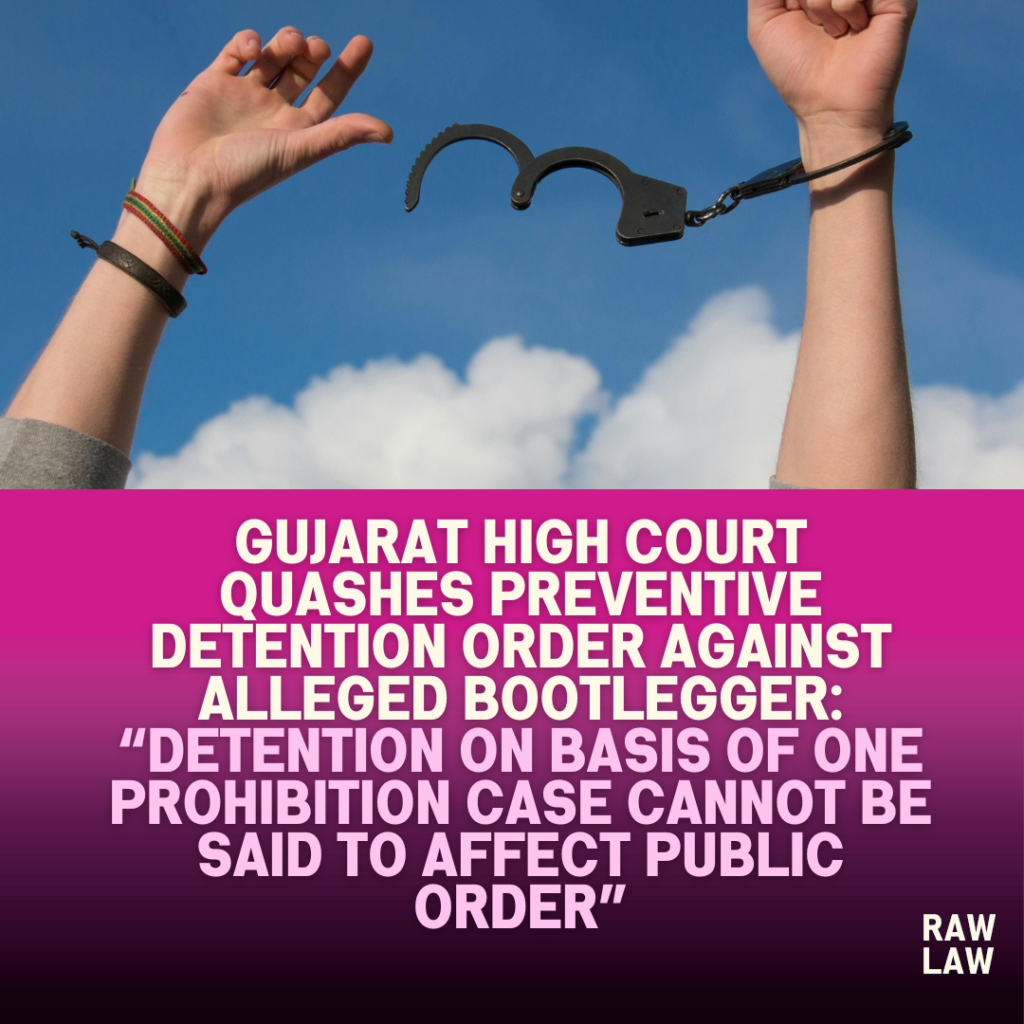Court’s Decision
The Gujarat High Court quashed the preventive detention order passed under the Gujarat Prevention of Anti-Social Activities Act, 1985, against the petitioner, who was detained as a “bootlegger”. The Court observed that there was no sufficient material on record to justify the claim that the petitioner’s activities had disturbed or were likely to disturb “public order” within the meaning of Section 3(4) of the Act. The Court held: “On the basis of one prohibition case, the authority has wrongly arrived at the subjective satisfaction that the activities of the detenue could be termed to be acting in a manner prejudicial to the maintenance of public order.”
Facts
The petitioner was preventively detained by an order dated 8 June 2025 passed by the Commissioner of Police, Surat City, on the ground that he was a “bootlegger” as defined under Section 2(b) of the Gujarat Prevention of Anti-Social Activities Act, 1985. This preventive detention was based on one criminal case registered under Sections 65(e), 81, and 98(2) of the Prohibition Act, for which the petitioner had already been granted bail.
Issues
- Whether registration of a single prohibition case can justify preventive detention under the Gujarat Prevention of Anti-Social Activities Act, 1985?
- Whether the detaining authority’s subjective satisfaction meets the legal threshold of being connected to maintenance of “public order”?
Petitioner’s Arguments
The petitioner contended that the detention order lacked a nexus with “public order” and instead merely related to “law and order”, which does not meet the statutory requirements under Section 3(4) of the Act. He argued that the offence in question did not adversely affect the public at large or disturb public tranquillity. Therefore, the detention was not legally sustainable.
Respondent’s Arguments
The State opposed the petition and argued that the petitioner was a habitual offender whose activities were prejudicial to society. The detaining authority, having considered his antecedents and involvement in the prohibition case, passed the detention order with a view to preventing further activities that could threaten public order.
Analysis of the Law
The Court analysed the scope of “public order” under Section 3(4) of the Gujarat Prevention of Anti-Social Activities Act. It held that not every breach of law amounts to disturbance of public order and referred to the principle that preventive detention is not warranted unless there is a demonstrable threat to public order.
Precedent Analysis
The Court heavily relied on:
- Piyush Kantilal Mehta v. Commissioner of Police, Ahmedabad, (1989 Supp (1) SCC 322): Where detention based on two prohibition offences was set aside. The Court held that such offences, without proof of causing panic or insecurity in society, do not justify preventive detention.
- Pushkar Mukherjee v. State of West Bengal, (1969 (1) SCC 10): This case distinguished “law and order” from “public order”. The Court held that a mere breach of law affecting individuals is not enough; the act must disturb the community or public at large.
Quoting from Pushkar Mukherjee, the Gujarat High Court reiterated: “A mere disturbance of law and order leading to disorder is thus not necessarily sufficient for action under the Preventive Detention Act.”
Court’s Reasoning
The Court observed that the detention order was based solely on one prohibition offence. The Court found no evidence to suggest that the alleged acts disturbed the even tempo of the community’s life, induced panic, or threatened public peace. It held that a single case without broader societal impact cannot meet the stringent standard of “public order” required for preventive detention.
Conclusion
The Gujarat High Court held that the detention order was not legally sustainable. It quashed the order dated 8 June 2025 and directed that the detenue be released immediately, provided he is not required in any other case.
Implications
This judgment reaffirms the distinction between “law and order” and “public order” in preventive detention cases. It underlines the need for authorities to demonstrate a clear and significant threat to public order before detaining an individual under preventive detention laws. The ruling provides safeguards against arbitrary use of detention powers under the Gujarat Prevention of Anti-Social Activities Act.
Referred Cases and Their Relevance
- Piyush Kantilal Mehta v. Commissioner of Police, Ahmedabad: Quashed detention based on two prohibition cases, reinforcing that public order must be impacted.
- Pushkar Mukherjee v. State of West Bengal: Clarified the distinction between public order and law and order; foundational to interpreting Section 3(4) of the Act.]
FAQs
Q1. Can a person be detained under the Gujarat Prevention of Anti-Social Activities Act for a single prohibition case?
No, unless the case demonstrates a clear threat to public order and affects the community at large.
Q2. What is the distinction between “law and order” and “public order”?
Law and order refers to disturbances affecting individuals, while public order affects society at large or creates a sense of panic or insecurity in the public.
Q3. What precedent governs preventive detention in bootlegging cases?
The Supreme Court in Piyush Kantilal Mehta held that mere registration of prohibition cases, without societal impact, is not enough to justify preventive detention.



